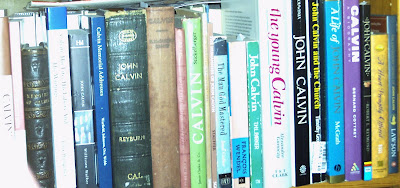
It seems that the historical books of the Old Testament seem to intimidate preachers. I have heard quite a number of older preachers speak from these books, but fewer young men. Perhaps one of the reasons some find the Old Testament difficult to preach is that Dispensationalism has made them confused about how to interpret the Old Testament. Also there has been a lot of bad preaching from the Old Testament, namely the rampant and uncontrolled allegorization of narratives. Younger preachers, aware that this allegorical approach is wrong, are left unsure of what to do with these stories. And yet I am assured that this is not a new problem. Even in the past, the majority of sermons were not preached from the narrative portions of the Old Testament. An examination of a volume of sermons from my library, published in 1898,
Welshmen in English Pulpits, reveals that, out of 30 sermons in the book, thirteen are from the Old Testament, seven of these from predominantly narrative books, namely Genesis (1), Exodus (1), 2 Samuel (1), 2 Kings (2), 1 Chronicles (1), and 2 Chronicles (1). An eighth, from Deuteronomy 2.3 is essentially narrative as well. Supposing that these sermons are representative of Congregationalist preaching from the late 19th century, we find that 26.7% of the sermons are from Old Testament narrative passages. The actual treatment of the text is not considered here, of course - some of them could be allegorized or taken out of context, though I hope not!
Because of this perennial issue,
The Word Became Fresh is an extremely welcome addition to homiletic literature. This is a book written by a man who knows what he's writing about, which is always a good start with a book.
Dale Ralph Davis is probably well-known to readers as the author of a number of excellent commentaries on historical books of the Old Testament, something that makes him eminently qualified to write on this subject. Davis does not offer a 'magic bullet' that will make preaching from Old Testament narrative texts a doddle, but a well-written book in which he lays out some commonsense suggestions for understanding and preaching narrative texts. Chapter one deals with the approach to the text. Happily, he opens with the need for the help of the Holy Spirit in opening the Bible. Only then does he go on to the technical elements of the approach to the text. Chapter two is entitled 'quirks', and deals with the peculiarities of narrative. Chapter three is on theology, referring to the theology of the text. Chapter four, 'Packaging', deals with the structure of the text. Chapter five deals with 'Nasties', particular texts that are difficult for us to preach from for various reasons - difficult because they're off-putting for some reason or other. Chapter six is called 'Macroscope', and is about interpreting the passage in light of the whole book in which it is found. Having done all that, we come to chapter seven, in which Davis deals with the question of application, something that is quite important in a narrative text - we can retell the story, but what does it mean? Chapter 8 is 'Center' (sic. Davis is American), in which he points out that we need to have a theocentric focus. Here there is a disagreement. I, with others, prefer to say that it ought to be
Christocentric. Not in a shallow, allegorizing way, but in that we approach the texts as
Christians, in the light of the New Testament, not as Jews. That is to say, as a Christian, I have to read the whole Bible in the light of the fulness of God's revelation in Christ. But then, perhaps Davis and myself are using the term 'Christocentric' in two slightly different ways. Finally he gives us a worked example in the final chapter. This is a book that every preacher ought to read, and perhaps it will help to make sermons from the narrative books of the Old Testament less of a rarity than they have become of late.
 Unless you are a rabid King James Only advocate, you will know about the existence of textual variants in the New Testament text. But how do we find out what those variants are, and what they mean? Why does the NIV read differently from the ESV in places? Why do both differ from the Authorised Version? What do you do when someone approaches you and asks about the variants? What about Bart Ehrman's contention that the variants represent radically different theologies?
Unless you are a rabid King James Only advocate, you will know about the existence of textual variants in the New Testament text. But how do we find out what those variants are, and what they mean? Why does the NIV read differently from the ESV in places? Why do both differ from the Authorised Version? What do you do when someone approaches you and asks about the variants? What about Bart Ehrman's contention that the variants represent radically different theologies?


















